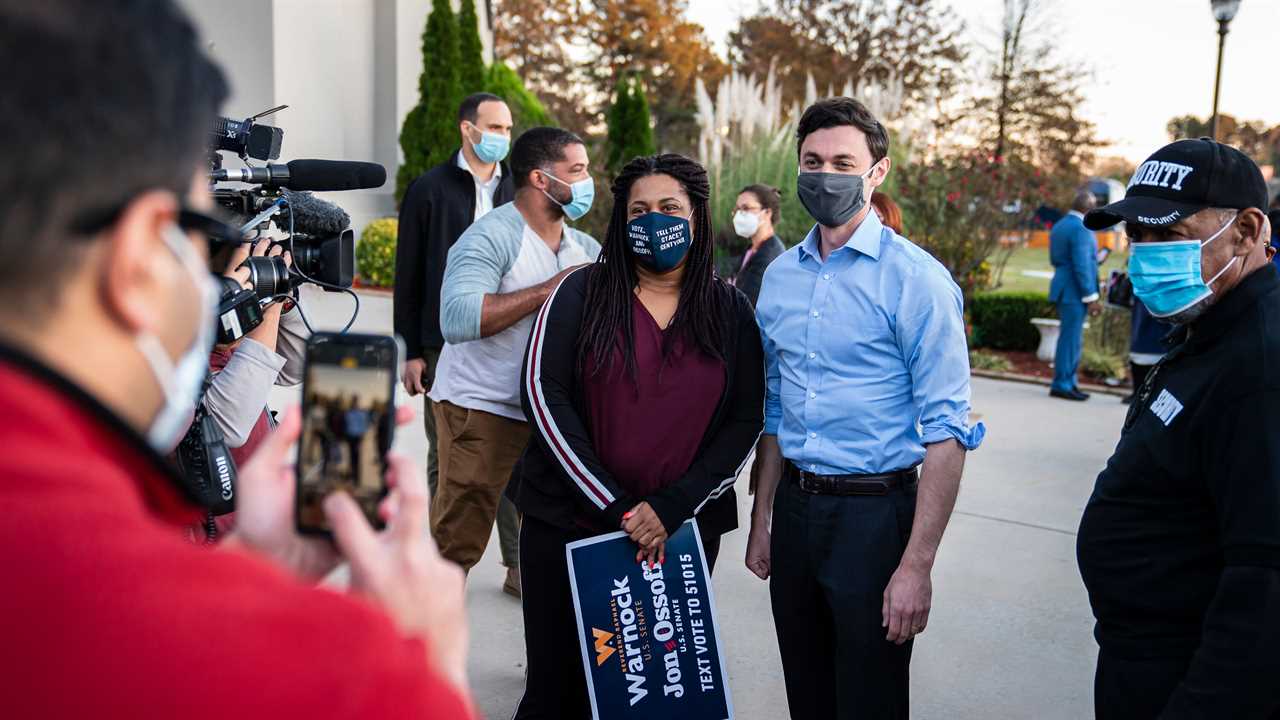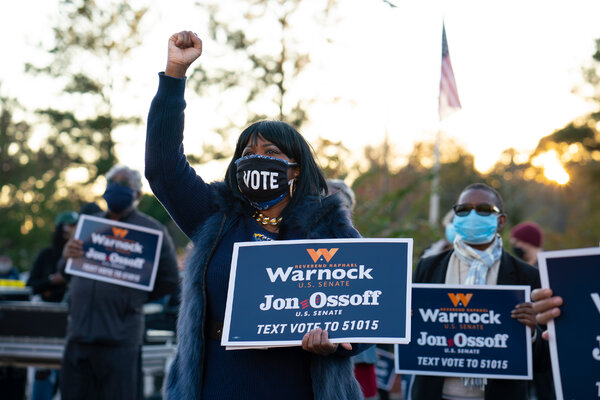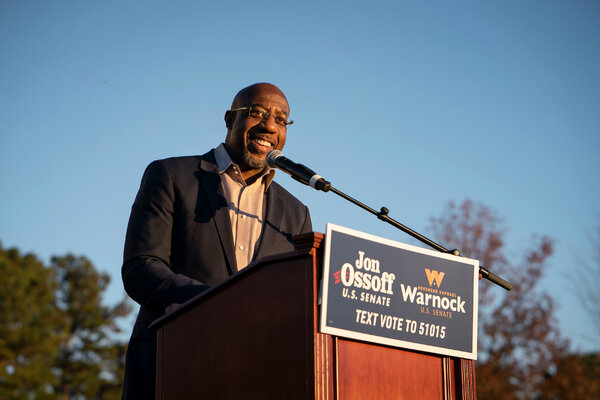
Neither Jon Ossoff nor the Rev. Raphael Warnock has endorsed the Green New Deal. But that hasn’t stopped the Sunrise Movement, the activist climate group that champions the sweeping climate change plan, from mobilizing in force for the two Georgia Democrats in their high-stakes runoff races for Senate seats.
The group is aiming to help register 10,000 to 20,000 Georgians who will turn 18 by Jan. 5, the day of the elections. It has people on the ground canvassing and dropping off campaign literature. And while its appeals mention the threat from climate change, it does not present the issue as a litmus test.
“Right now, we’re focused on the bigger picture,” said Shanté Wolfe, who is leading the Sunrise Movement’s work in Georgia. “Our effort is in favor of the greater good.”
The furious efforts in Georgia by the Sunrise Movement and other progressive groups — on behalf of two candidates who do not share their most ambitious policy goals — reflect the urgency that is consuming the Democratic Party’s left flank. Two victories in Georgia would produce a 50-50 tie in the Senate, giving Democrats control of the chamber because Kamala Harris would cast tiebreaking votes as vice president.
Without Democratic control, progressive lawmakers, activists and their grass-roots supporters worry that they will not be able to achieve even a pared-down version of their policy wish list for the country.
But they also understand that for decades Georgia has been a Republican stronghold with a large number of conservative voters, and that their efforts there need to be modulated. President-elect Joseph R. Biden Jr. won the state, many Democrats point out, with a moderate agenda that tempered the rhetoric and policy goals of the left. Mr. Biden, Mr. Warnock and Mr. Ossoff do not support “Medicare for all,” another priority of the party’s left wing.
Ms. Wolfe said the Sunrise Movement had tried to adjust its messaging for a state like Georgia by “making sure that we localize the Green New Deal in a way that resonates with Southerners.” For instance, canvassers are emphasizing how climate change affects the air that Georgians breathe, she said.
Other groups are also pouring money and resources into the state.
The Progressive Change Campaign Committee has already raised $386,000 for the two Democratic candidates. MoveOn, a progressive group, hopes to mobilize many of its 250,000 members in Georgia, and more nationwide, to canvass and phone bank in the state. Our Revolution, the political organization that spun out of Bernie Sanders’s 2016 presidential campaign, is currently contacting its 50,000 member households in the state to encourage them to request mail ballots.
“We are moving heaven and earth and pointing all of our resources as much as we can to help us win those two seats in Georgia,” said Jamaal Bowman, a New York Democrat who will be sworn into the next Congress.
Mr. Bowman said he spoke recently with Stacey Abrams, who narrowly lost the Georgia governor’s race in 2018 and is widely credited with voter turnout initiatives that helped flip Georgia blue this year, to see how he could support her efforts. And he said that he and other progressives in the House — including “the Squad,” a now-growing group that began with four congresswomen of color — were strategizing about how to help in Georgia.

“Georgia is not New York. It’s not California. It has its own culture,” Mr. Bowman said. “But it’s a culture rooted in justice for all, and we just want to make sure we support that initiative as much as we can, as representatives from other parts of the country.”
Amid deepening ideological fault lines among Democrats over messaging and electoral strategy — divisions that have burst into the open as the party takes stock of its painful losses down the ballot — the two Senate runoff elections will also be a test case for whether progressives can balance their broad calls for change with the realities of campaigning in a once reliably Republican state.
Defeating two Republican incumbents, Senators David Perdue and Kelly Loeffler, will be no easy task for Mr. Ossoff and Mr. Warnock. Still, the competitiveness of the races, and the progressive focus on Georgia, underscores the political evolution occurring in the state.
Mr. Biden was the first Democratic presidential candidate to win the state since Bill Clinton in 1992. And though Georgia does not have a reputation now as a hotbed of liberalism, some organizers and strategists inside and outside Georgia contend that it is becoming increasingly receptive to left-leaning ideas.
While many of the Democrats who won in Georgia last month were more moderate, including Carolyn Bourdeaux, who flipped a longtime Republican House district in metropolitan Atlanta, several local progressive candidates won farther down the ballot. They include Nicole Love Hendrickson, who became the first Black person elected as commission chairwoman of Gwinnett County, in suburban Atlanta.
Progressives see Georgia not as a one-off endeavor in 2020 but as a top target of their efforts for years to come.
“Is Georgia a Tier 1 state? Is Georgia a progressive state? Are we building a new Georgia? Yes, yes and yes,” said Britney Whaley, a political strategist with the Working Families Party, a progressive group that has been operating in Georgia since 2018 and has endorsed Mr. Warnock.
Nse Ufot, the chief executive of the New Georgia Project, which was founded by Ms. Abrams and has registered hundreds of thousands of new voters, said there was still “an obsession with moving white moderate men back into the Democratic Party.” But that thinking was mistaken, she said, even — and perhaps especially — in Georgia.
“It just feels like people do not get, and do not understand, what it takes to win and what it takes to win in the South,” she said. “We can contribute to this progressive majority — it’s just that it can’t be race-blind. It can’t be race neutral.”

There are plenty of signs that suggest liberals still face an uphill battle in Georgia. Mr. Sanders, the Vermont senator and progressive standard-bearer, lost Georgia’s Democratic presidential primary to Hillary Clinton by more than 40 percentage points in 2016. (Mr. Sanders had dropped out of the race by the time Georgia held its primary in June this year.)
Mr. Biden beat President Trump in Georgia by making significant gains among affluent, college-educated and older voters in the suburbs around Atlanta, according to a New York Times Upshot analysis of the results; at the same time, the Black share of the electorate fell to its lowest point since 2006.
Those findings indicate that Democrats must still depend on the support of traditionally conservative voters to win statewide — rather than turning out a progressive majority led by young voters and nonwhite voters.
Even if the Democrats win the two Georgia Senate seats, progressives will still face significant barriers to passing their policies. It is unlikely that all 50 Democratic senators would get behind a left-wing policy proposal like expanding the Supreme Court, or that Mr. Biden would support it.
Representative Ro Khanna of California, the first vice chair of the Congressional Progressive Caucus, said the Georgia races were “about the here and now.”
“We understand the stakes, and every progressive group that I know of has made that a priority with the same passion and determination as winning back the presidency,” he said.
But he also said the horizon for the movement was long. Even if Democrats fail to win control of the Senate, he said, progressives should try to pass an agenda in the House that includes less transformative policy goals than Medicare for all — including raising the minimum wage, forgiving student loan debt and expanding access to Medicare.
“I don’t think that their outcome should determine the boldness of our agenda,” Mr. Khanna said, referring to the Georgia runoffs. “The mistake would be to pull back.”
For the party’s left wing, the potential limits on a progressive agenda have not dampened the resolve.
In a fund-raising email last month, Senator Elizabeth Warren of Massachusetts hailed Mr. Biden’s success as proof that “the path to victory in Georgia is clearer than ever.”
Then she issued a call to arms: “Democrats can win these two Senate races too — and we must.”






